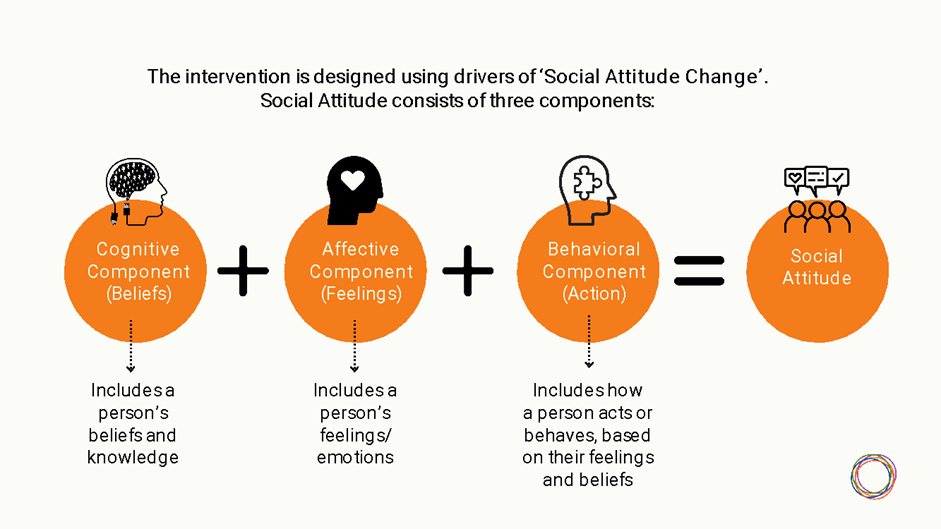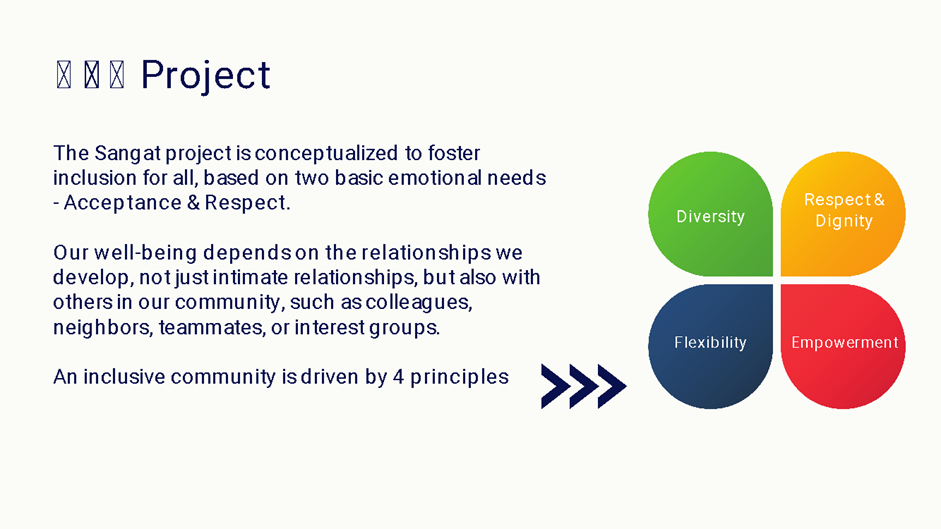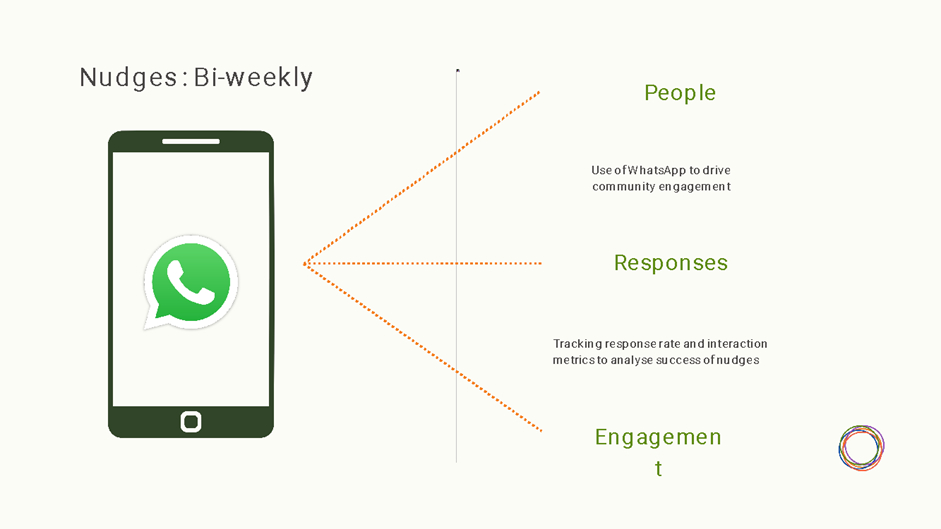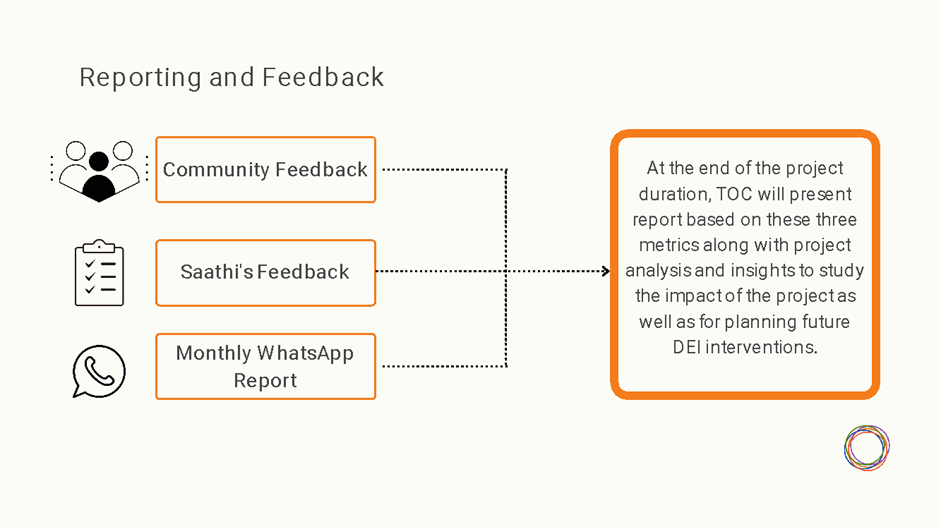Sangat Case Study
Our esteemed client is an Indian multinational manufacturing company valued at more than USD 8 Billion. They are the market leader in the line of products they manufacture and operate in multiple countries including UAE, Bahrain, and Sri Lanka. Manufacturing units are located at remote places and hence manufacturing units have residential colonies to accommodate employees working in the unit. Due to these characteristics, the company was facing unique organisational problems.
Why: Problem Statements
- Historically homogeneous workforce leading to low diversity in gender
- Legacy culture practices like strict hierarchies affecting employee morale and productivity.
- Lack of inclusive culture leading Instances of unconscious bias and microaggressions reported in internal surveys.
What: Introduction
Sangat was a conceptualised solution to transform organisational cultures to foster inclusivity, equity, and diversity through highly tailored interventions. The intervention is designed using drivers of ‘Social Attitude Change.’
Social attitudes are the shared perceptions and reactions of individuals toward societal issues or norms. These attitudes are formed based on personal experiences, cultural norms, and interactions with others. Social Attitude Change refers to the modification of collective beliefs, feelings, and behaviours toward social norms or issues over time. These attitudes are not fixed and can evolve due to various factors such as communication, cultural shifts, and social influences.
Social Attitude consists of three components:

- Cognitive component which includes person’s belief and knowledge
- Affective component which includes person’s feelings and emotions
- Behavioural component which includes person’s behaviour based on their emotions
SANGAT project is based on 4 key Principles of inclusions:

- Diversity: Vividhata
Diversity refers to the presence and inclusion of individuals from a variety of backgrounds, including different races, castes, genders, ages, sexual orientations, disabilities, and cultural backgrounds. It emphasises the value of having a wide range of perspectives and experiences within a group or organisation.
- Respect & Dignity: Samaann
Respect involves showing consideration and regard for others, valuing their feelings, thoughts, and rights. Dignity refers to the inherent worth and value of every individual. In the context of DEI, fostering respect and dignity means ensuring all individuals feel valued, respected, and treated fairly, regardless of their differences
- Flexibility: Anukulansheelata
Flexibility in a DEI context refers to the ability of an organisation or individual to adapt and accommodate diverse needs and perspectives. It involves creating an inclusive environment where various approaches and viewpoints are considered, and adjusting policies or practices to support the well-being and success of all members.
- Empowerment: Sashktata
Empowerment means providing individuals and groups with the resources, support, and opportunities they need to take control of their lives and make meaningful contributions. It involves fostering an environment where everyone has the confidence and ability to express their ideas, pursue their goals, and influence decision-making processes.
Sangat is a community wellbeing project. By leveraging these principles of inclusion, Sangat will help people identify their biases, assist in building inclusive community, increase the understanding of change, aid in identifying barriers to change, provide guidance on breaking hierarchies and extend required support in accelerating change.
Objective
- Increase diversity by including more women and young employees.
- Shift mindsets to value diversity and inclusion as core organisational strengths.
- Foster an inclusive culture where all employees feel valued and respected.
- Address and mitigate unconscious biases and microaggressions.
- Institutionalise the SANGAT project and make it process driven instead of person driven.
Methodology/Framework
- There was an initial assessment of the company’s policies, practices and culture. This was completed by conducting surveys and FGDs.
- A strategy was developed in collaboration with key stakeholders, including senior leadership and HR to achieve clear and measurable goals. This included a detailed action plan outlining specific interventions and timelines.
- “SANGAT” came into existence after discussions with the stakeholders.
- Visual Cues : Apart from the above interventions, visual references like posters are used to nudge participants on concepts of inclusion and also to gauge their progress. This includes placing posters displaying in depth meaning of the concepts of inclusion focused on themes of belonging, empathy, change, diversity and allyship.
- Sustenance: The key design component of Sangat is sustenance. By the end of the third session, Sangat is sustained by the Community Resource Groups. Sangat creates a self-sustained community for the well being of everyone without the dependence on the central clubs.
Sangat Roadmap
- Three large scale interactive workshops namely Samavesh, Atmiyata and Sarthi.
- Formation of Community Resource Groups
- Monitoring activities on whatsapp and weekly nudges
- Sustenance by institutionalising Sangat via. Sangat Vani, Sangat Neeti, and Sangat Sammelan
The 3 DEI workshop sessions are as follows:
Samavesh: Inclusion
Samavesh is the first session of the Sangat initiative which lays the foundation by informing the audience about Sangat and introducing them to the entire journey of the program. The workshop is a 3/4 hour highly interactive, action packed, and engaging program to break the ice with the community members and drive a sense of belonging, inclusion, and psychological safety. This session is intended to sensitise community members on how to manage their biases and practise new behaviours. This program is the first positive step toward managing hidden biases and reducing their adverse effects on social interactions, diversity, equity, and inclusion efforts.
Atmiyata: Belongingness
Atmiyata is the second session of the Sangat initiative. This workshop is three and a half hours long which focuses on the theme of empathy and change. This is an interactive session to decode the inequities within a community and identify actions to address these inequities by creating an inclusive and thriving community. This program is designed with a commitment to promoting the cause of gender equality in general and also to having conversations to enable gender-sensitive and psychologically safe spaces, especially for the safety of women, and girls in all spheres.
Saarthi: Allyship
Saarthi is the concluding session of Sangat. This is an interactive session to explore the meaning of the term ally and identify actionable first steps that employees can take to be a more active and visible ally. This program will also provide a jumpstart for community leaders who want to be a part of the change process, actively participate in the inclusion process, and champion the “diverse and inclusive culture” cause.
Formation of Community Resource Groups (CRGs)
Community Resource Groups (CRGs) are voluntary associations in each manufacturing unit. The group comprises the members who are colony residents who are interested to volunteer and contribute towards fostering connections among individuals sharing common interests and goals. CRGs work by providing a platform for members to collaborate, support each other, and advocate for inclusivity and diversity within the organisation. They organise events, workshops, and initiatives to create a platform for community interaction. It also serves as a space to share ideas among members and the broader community. CRGs contribute to a positive work culture, enhance employee engagement, and foster a sense of belonging and empowerment among participants.
Weekly Nudges
Weekly WhatsApp nudges are strategic messages or posts designed to engage the colony residents. These nudges are personalised and timed to reinforce the message delivered in Sangat workshops for continuous learning. Nudges also encourage thought provoking discussions on the theme of inclusion. By leveraging WhatsApp nudges, we create interactive experiences, foster relationships, and drive conversions. Nudges included images, videos, text messages and polls, all aimed at maintaining active communication and strengthening relationships. They play a crucial role in keeping the audience engaged, informed, and connected with each other, leading to inclusive culture, respect and dignity for all genders, and openness to new ideas.

Measuring the success of Sangat project in each unit
A Sangat tree is a life sized installation which features a barren tree with a bark and a few stems. Participants are provided stickers of leaves, flowers and fruits to stick on the Sangat tree installation. This creates a visual representation of their current progress. It is used to help participants visually identify the progress of the project and to constantly motivate them to improve their performance.
Monitoring
Zoom calls with CRG every fortnight, to review progress. Elements for review include activities, participation, and interactions on whatsapp. Zoom calls also present an opportunity for CRGs to ask for support needed or any challenges encountered.

Sustenance
The CRGs will continue to carry out activities on their own. Sangat will be institutionalised with the onset of Sangat Vani, Sangat Neeti and Sangat Sammelan.
Sangat Vani: Cluster-wise quarterly e-newsletters can be published. This will serve as an opportunity for units to showcase unique initiatives undertaken. Each Unit Head will be the custodian of the SANGAT submissions and complete project.
Sangat Neeti: Cluster-wise Monthly Dashboard announcement based on 3 parameters namely Togetherness/Cohesion, Respect/Dignity and Empowerment.
Sangat Sammelan: Cluster-wise half yearly Rewards & Recognition program where one of the units can host Sangat Sammelan, CRG members will participate along with other nominated committee members.
Execution
Each Sangat workshop is a two day programme. The first day is utilised for workshop delivery and the second day is dedicated to briefing Community Resource Groups formed the day before. This CRG is responsible for charting out the needs of the colony residents and also discussing the ways to implement the plan. The CRGs are usually divided into 4 subgroups viz. Physical and Fitness Committee, Infrastructure Committee, Cultural Committee and Spiritual Committee. These committees decide the plan of action for the next 3 months and the activities planned are executed in these 3 months. In these 3 months, there is constant communication via the weekly nudges and their action is recorded in a sheet to evaluate the progress made in the unit post Sangat.
Impact
- Reduction in hierarchical barriers, fostering a more collaborative and inclusive work environment.
- Decrease in reported instances of unconscious bias and microaggressions.
- Greater awareness and understanding of DEI principles among employees.
- Enhanced employee morale due to a more inclusive and supportive workplace.
- Higher productivity resulting from a more engaged and motivated workforce.
Conclusion
Through a comprehensive mindset change intervention, we partnered with ABC to transform its organisational culture. By embedding DEI principles into every aspect of the business, ABC not only improved its workplace environment but also positioned itself as a forward-thinking leader in the industry. The success of this intervention demonstrates the power of strategic DEI efforts in driving meaningful, sustainable change.
